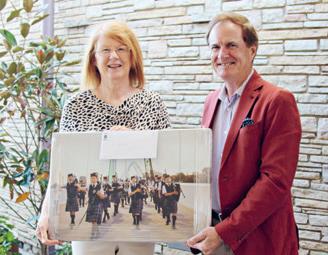
2 minute read
TRINITY MATHEMATICS RECOGNISED
Earlier this year, Trinity was recognised by the Australian Curriculum, Assessment and Reporting Authority (ACARA) for achieving consistently high progress in numeracy. This is a tremendous result with all students and staff to be commended for their ongoing hard work and commitment.
As a result of receiving this recognition, ACARA requested to profile the approach our College takes to mathematical learning with the objective of finding consistent approaches within high performing schools that could have potential for wider application.
OUR HIGH PROGRESS APPROACH
Currently, our College follows the Western Australian version of the Australian Curriculum to build and deliver mathematics on a digital platform with no reliance on textbooks. By using this platform to deliver, it allows us to review student work and performance and offer a level of differentiated curriculum within classes. With a focus on journaling in the Middle School years, students are asked to copy class notes into a journal. This demonstrates to students that mathematics is not just numbers, but a process that can help reinforce the habits of reflective learning, emphasises process and serves as a starting point to review content in the lead-up to an assessment. The use of OneNote gives students access to their teacher’s online notes and examples that enables them to review the day’s work and annotate changes in their own journals. It further provides staff the ability to work collaboratively, share resources with new staff and help them mentor others. During the Middle School years, we also model problem-solving that is not only limited to problem-solving techniques but includes monthly problem-solving tasks. Students are asked to produce one-page, hand-written reports, outlining solutions to hypothetical problems that do not always have unique solutions. The problem is often centered around the current teaching topic and encourages students to investigate, model and explain what their result means in the context of the problem. From Term 3, Year 7 students are placed in streamed mathematics classes with other students of similar mathematical ability. This helps our teachers design and deliver content at a pace and level of complexity suitable to the students. We firmly believe that success builds motivation so it’s important that we set assessments at an attainable, yet challenging level for each stream.
We ensure students understand that their starting point is not a reflection of their inherent ability in mathematics and that there is every opportunity for transferability between streams right through to Year 10. For more information on ACARA, visit their website www.acara.edu.au. The Trinity College Mathematics Learning Area prides itself on the staff’s blended approach to curriculum delivery. The use of journaling with handwritten notes, online adaptive homework, problem solving activities, use of OneNote and the use of traditional textbooks develops a culture of adaptive, resilient and reflective learning. This multi-modal approach enables students to experience success and encourages them to become lifelong learners.
Mr Paul Presser
Trinity College Mathematics Teacher











